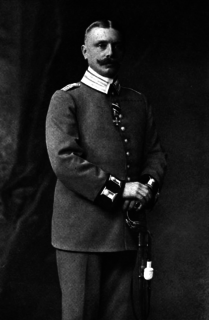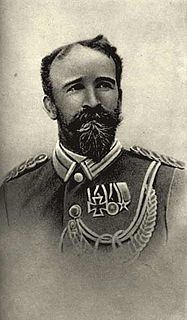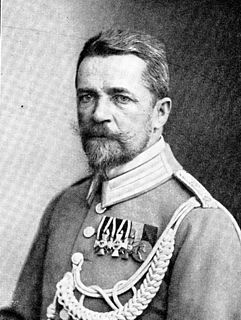 W
WSchutztruppe was the official name of the colonial troops in the African territories of the German colonial empire from the late 19th century to 1918. Similar to other colonial armies, the Schutztruppen consisted of volunteer European commissioned and non-commissioned officers, medical and veterinary officers. Most enlisted ranks were recruited from indigenous communities within the German colonies or from elsewhere in Africa.
 W
WBerthold Karl Adolf von Deimling was a general officer of the German Army during World War I.
 W
WHermann Philipp Detzner was a German engineer and surveyor, who served as an officer in the German colonial security force (Schutztruppe) in Kamerun (Cameroon) and German New Guinea. He gained fame for evading capture after Australian troops invaded German New Guinea at the start of World War I.
 W
WHans Dominik was a German colonial officer of the Schutztruppe. He was the long-time commander of the Jaunde military station in Kamerun.
 W
WFranz Ritter von Epp, born Franz Epp, from 1918 Ritter von Epp, was a German general and politician who started his military career in the Bavarian Army. Successful wartime military service earned him a knighthood in 1916. After the end of World War I and the dissolution of the German Empire, von Epp was a commanding officer in the Freikorps and the Reichswehr. He was a member of Bavarian People's Party, before joining the Nazi Party in 1928, when he was elected as a member of the German parliament or Reichstag, a position he held until the fall of Nazi Germany. He was the Reichskommissar, later Reichsstatthalter, for Bavaria, and a Reichsleiter of the Nazi Party.
 W
WLudwig von Estorff was a German general during World War I.
 W
WCurt Karl Bruno von François was a German geographer, cartographer, Schutztruppe officer and commissioner of the imperial colonial army of the German Empire, particularly in German South West Africa where he was responsible on behalf of Kaiser for the foundation of the city of Windhoek on 18 October 1890 and the harbor of Swakopmund on 4 August 1892.
 W
WErich Victor Carl August Franke was a German military officer and last commander of the Schutztruppe in German South West Africa. Franke was born in Zuckmantel, Austrian Silesia. He was Bezirksamtmann in several locations in German South West Africa, especially Ovamboland and Kaokoveld. He was stationed at Outjo from 1899 until 1910, and was involved in several campaigns against native tribes who resisted German colonial rule. In the early phases of the Herero Genocide of 1904, he was dubbed "Hero of Omaruru", because of his victory over numerically superior Herero forces at Omaruru. He also had successful campaigns against the Herero at Okahandja and Windhoek.
 W
WGustav Adolf Graf von Götzen was a German explorer and Governor of German East Africa. He came to Rwanda in 1894 at the head of a troop of 620 soldiers, becoming the second European to set foot in Rwanda, after Oscar Baumann, and later became the first European to cross the length of Rwanda. Götzen was the first governor of German East Africa.
 W
WJoachim von Heydebreck was a German military officer who was born in Schwedt and grew up in Zützen. He was the son of Prussian Lieutenant General Henning von Heydebreck (1828–1904) and his wife Anna von Colmar (1837–1879).
 W
WHeinrich Kirchheim was a German generalleutnant who served in both World War I and World War II. He is also one of few German officers who were awarded the Pour le Mérite and the Knight's Cross of the Iron Cross. He also served as a deputy member on the "Court of Military Honour," a drumhead court-martial that expelled many of the officers involved in the 20 July Plot from the Army before handing them over to the People's Court.
 W
WPaul Emil von Lettow-Vorbeck, also called the Lion of Africa, was a general in the Imperial German Army and the commander of its forces in the German East Africa campaign. For four years, with a force of about 14,000, he held in check a much larger force of 300,000 British, Indian, Belgian, and Portuguese troops.
 W
WTheodor Gotthilf Leutwein was colonial administrator of German Southwest Africa from 1894 to 1904.
 W
WGeorg Ludwig Rudolf Maercker was a German general of World War I.
 W
WHermann Meyer-Rabingen was a German general in the Wehrmacht during World War II. He was a recipient of the Knight's Cross of the Iron Cross.
 W
WJob Odebrecht was a German general during World War II. He was also a recipient of the Knight's Cross of the Iron Cross of Nazi Germany.
 W
WArnold Schultze was a German officer, geographer, and entomologist who specialised in Lepidoptera.
 W
WTom von Prince was a German East Africa Company military officer and plantation owner in German East Africa. He most notably, as a captain in the Schutztruppe, led the first action by German forces in East Africa during World War I by seizing Taveta on 15 August 1914, and was then killed in November at the Battle of Tanga.
 W
WGeneral Adrian Dietrich Lothar von Trotha was a German military commander during the European new colonial era. As a brigade commander of the East Asian Expedition Corps, he was involved in suppressing the Boxer Rebellion in Imperial China, commanding troops which made up the German contribution to the Eight-Nation Alliance. He later served as governor of German South West Africa and Commander in Chief of its colonial forces, in which role he suppressed a native rebellion during the Herero Wars. He was widely condemned for his brutality in the Herero Wars, particularly for his role in the genocide that led to the near-extermination of the Herero.